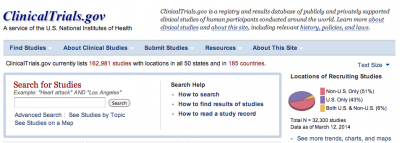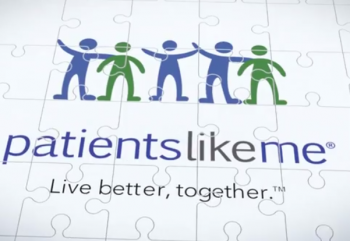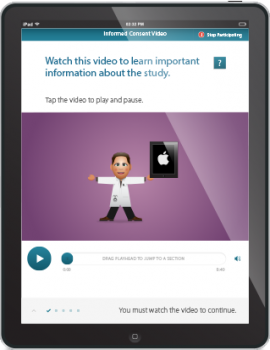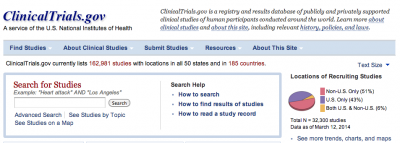Clinical trials for cancer patients can be a life-saving opportunity. But most clinical trials do not even finish due to lack of patient participation. Why is this?
Clinical trials for cancer patients can be a life-saving opportunity. But most clinical trials do not even finish due to lack of patient participation. Why is this?
One big issue is that many cancer patients do not hear about relevant clinical trials. Physicians often do not mention them because either they don’t know about them or because of time constraints. It takes a good deal to time to explain about a clinical trial to a patient and then to help walk them through the approval process and answer their questions. Many physicians do not have the time or the staff to do this. And often, cancer patients are too overwhelmed to inquire.
I asked Andrew Schorr, two-time cancer patient and founder of PatientPower.info, why he thought that more patients don’t know about clinical trials when they are first diagnosed with cancer. Schorr answers,
“When patients are just told they have cancer, they feel afraid and alone. They rely on their doctor for guidance and don’t think of looking elsewhere for information. It does not occur to them to think of participating in a clinical trial for treatment.”
I asked Jim Omel, a 13+ year myeloma survivor and retired family physician who has participated in NCI (National Cancer Institute) peer reviewed research and who is a patient advocate working with The Alliance for Clinical Trials in Oncology, about his thoughts on why more patients aren’t aware of clinical trials. Dr. Omel explains,
“We definitely need to elevate the consciousness of the public about clinical trials; there’s no doubt about that. We need to educate the public about the providing of tissue, sharing clinical data. So many people have this misconception that they are “guinea pigs” which is a term we all abhor.” But it’s a term that people relate to clinical trials; they see themselves as test subjects rather than receiving the best of care, the most up to date care that you get with a clinical trial. A lot of it is public perception. We have to change this. As cancer research advocates, we are trying our best to get the word out.”
The internet and social media have done a good job in trying to get the word out about clinical trials. The government website, ClinicalTrials.gov lists all trials by illness and location and includes some brief help topics and a glossary of terms. And Cancer.gov lists clinical trials specifically for types of cancers.

Some patient support groups like PatientsLikeMe have their own clinical trial search tool. I took a look at the PatientsLikeMe tool and it did seem quite a bit more user friendly than the government site. It also mentions how many members of PatientsLikeMe may be eligible for the trial, links to a glossary and to the government site for more detailed information. I asked Paul Wicks, Vice President of Innovation at PatientsLikeMe about the tool and he explained,
“PatientsLikeMe’s global clinical trials tool draws on open data to match patients from around the world with a wide range of clinical trials based on their condition, location, age, or any other criteria. Patients can search for and identify a range of trials using a simple interface, and create a profile so they can be automatically alerted to trials that match their criteria.”

When asked about the efforts of individual foundations and organizations in informing their members about clinical trials, Dr Omel explains,
“In the case of myeloma which I am most familiar with, the Multiple Myeloma Research Foundation and the International Myeloma Foundation have done a pretty good job of educating myeloma patients about new drugs and research going on. If you think about it, we have had six new drugs for treatment of myeloma in the last decade and that is unbelievable progress in oncology. The myeloma community really does work together and patients realize that we have these new drugs because patients before us signed up for those clinical trials.”
Another big issue with recruiting patients for clinical trials is the complexity of enrolling in the trial itself. The informed consent process is difficult to understand and many patients are daunted by the process.
Physicians can help explain the process, but again, often do not have the staff or the time. Families often cannot help unless they are familiar with the process. Patient Advocates certainly can and do help if they are available.
There are many issues to be covered during the enrollment process. What is the criteria for enrollment? How far does the patient have to travel? Will the patient have insurance coverage for standard care during a clinical trial? Will the patient get the new fancy drug or will they get a placebo or other type of treatment? Will the trial accept patients that have other health issues like a heart or kidney condition?
Informed consent should be written for the patient, but it is not. Providers and drug manufacturers want to be protected and often the complex medical and legal terminology included in the document is discouraging to a patient.
Efforts have been made to simplify the informed consent process. Fact sheets have been developed and videos have been made that try and explain the process easily so patients can understand.
PatientsLikeMe offers their clinical trial tool that helps simplify the process for their members, and other patient support sites may help walk their members through the process or have tools to help simplify things.
During my research on this subject, I came across an interesting product and website. Mytrus Enroll is a software product that simplifies the informed consent process. The Mytrus website states:
“Enroll is a gateway technology that allows critical disclosure information to be condensed into an easy-to-understand, digitized format using animation, interaction, and visual imagery. Patients can interact with the app, marking terms and concepts that they want to discuss, completing easy to use knowledge assessments, and providing regulatorily compliant signatures to indicate their consent.”
I spoke with Michael Tucker at Mytrus and he explained that Mytrus is making great headway in the clinical trial tool arena. The company started by developing technology as a response to patients who wanted to participate in clinical trials but lived far away from a trial site. Mytrus wanted these patients to be able to enroll and participate in a trial mostly from their own home, reducing the amount of times they would have to go to the trial site for visits. With the technology they developed, patients can enroll remotely and go through the screening process using the Enroll software.
Mytrus tries to give patients a better understanding of the informed consent process and the clinical trial screening criteria by video (see here for a sample video). All Mytrus and Enroll videos and information are IRB approved.
Tucker went on to say that several studies have been done to determine the effectiveness of the video approach to the informed consent process. One such study done at the University of California at San Francisco showed that the comprehension and recall rate was superior in the video approach (75%) as opposed to the paper approach (58%). Better comprehension is better for the patient and better for the study overall. Tucker further explains,
“The conclusion from this that is usually drawn is that if you have a higher comprehension rate, you will get better qualified patients. More patients will participate if they understand what is going on.”
While efforts are being made to better inform patients and the public in general about clinical studies, and the internet and technology seem to be helping the informed consent process, there is still a long ways to go as far as streamlining or adapting the clinical study process to make it more patient-friendly.
A big deterrent to adequate patient accrual for clinical trial is the way that the studies are designed. Often, the screening is very restrictive. Patients with any other conditions or illnesses besides the condition being tested are not permitted to take part in the study, greatly reducing the pool of potential participants. Furthermore, often the patients are randomized in the study and many may never receive the new important drug being tested. Understandably, many patients react negatively to this and will refuse to participate in such a study. These obstacles will be difficult to overcome. Statisticians that build these studies want the restrictions and the randomization. Until there is a resolution to this problem, patient accrual will always be an issue. In an article he wrote for the Myeloma Beacon, Dr. Omel comments,
“What good is a statistically perfect, well-designed trial if nobody shows up? Our current system is broken and needs new approaches to randomize patients based on their informed right to choose their own treatment. This profound decision affects their life and their cancer. Treatment should be their choice…
To all who denounce such an unscientific approach, please outline an improved system based on a patient’s absolute right to choose his treatment. We can ‘think outside the box’ and use a different approach, or we can keep the same system and get the same results—3 percent participation with many drop-outs. Without a change, we will continue to observe that only a tiny minority of clinical trials open, accrue, close, and are reported in a timely manner with useful information for clinicians and cancer patients.”
Resources:
http://www.sireninteractive.com/sirensong/dr-katz-from-fda-talks-social-media-and-clinical-trials/







